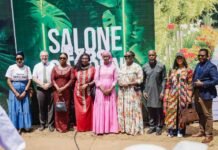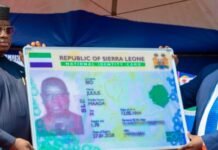By Foday Moriba Conteh
In a bid to impart knowledge of human rights to journalists for them to inculcate human rights reporting skills in the country, the Human Rights Commission has on Thursday 20th June 2024 concluded a one-day training for selected journalists on Human Rights-Based Approach to News Reporting. The training, which brought together journalists from various media houses, was held at the Peace Museum, Special Court on New England Ville in Freetown.
In his remarks, the Secretary General of the Sierra Leone Association of Journalists (SLAJ), Alhaji Manika Kamara, expressed SLAJ’s delight in being part of such professional training sessions, emphasizing their importance in building and strengthening the capacity of journalists, particularly in specialized areas like human rights reporting.
“Today’s workshop is designed to deepen your understanding of how human rights principles can and should be integrated into your reporting. By focusing on dignity, equality and respect, we can ensure that our stories not only inform but also empower our readers and listeners. We also highlight human rights situations and experiences of marginalized people and communities,” he asserted.
He highlighted the importance of incorporating a human rights perspective in journalism, noting that this approach helps in telling stories that reflect diverse voices and experiences while advocating for justice and accountability for the voiceless, poor and powerless.
“You also need to know about the local and international laws, treaties and conventions on human rights to get you more grounded in reporting human rights,” he added.
He also encouraged participants to actively engage in the workshop, ask questions and critically evaluate the impact of their work. Alhaji Manika Kamara expressed gratitude to HRCSL for organizing the training and called for continued collaboration to enhance the knowledge, skills and understanding of journalists.
“Together, we can contribute to a more informed and just society. Let’s make the most of this opportunity to learn and grow,” he concluded.
The workshop aimed to equip journalists with the skills needed to integrate human rights principles into their reporting, fostering a more informed and equitable media landscape in Sierra Leone.
On her part, Patricia Narsu Ndanema, Chairperson of the Human Rights Commission of Sierra Leone, underscored the vital role of the media in promoting and protecting human rights in Sierra Leone.
She said that established in 2004 through Act No. 9, the Human Rights Commission of Sierra Leone was founded based on recommendations from the Lome Peace Agreement of 1999 and the Truth and Reconciliation Commission of 2004. These institutions identified the denial of human rights as a key factor in the country’s civil war, noting the absence of structures for aggrieved individuals to seek redress. The Commission now serves as the national body to promote and protect human rights, acting as a redress mechanism for violations, she informed.
The Chairperson revealed that in 2021, the Commission was reaccredited as a ‘Grade A’ National Human Rights Institution by the Global Alliance Network for National Human Rights Institutions (GANHRI), a recognition it has achieved three times. According to her, that accreditation confirms the Commission’s adherence to the United Nations Paris Principles, which govern the operations of NHRIs worldwide.
She highlighted the importance of collaboration with journalists, recognizing them as essential partners in disseminating information and raising public awareness.
Patricia Narsu Ndanema emphasized that while journalists often report Government failures in protecting human rights they must also highlight when issues are resolved to provide a balanced perspective.
“We sometimes see the excitement by some journalists to report how the Government has reneged in meeting its human rights obligations, but when concerns are addressed, we don’t get reports on them. This denies right holders access to information,” she stated.
The Human Rights Commission Chairperson cited an incident where misinformation about a politician’s alleged torture in solitary confinement caused public distress. An investigation by the Commission found those claims to be false, demonstrating the impact of accurate and responsible reporting.
She also shared a positive example of media intervention. A journalist’s social media post about 10 underage girls taken to a Bondo Bush prompted the Commission to act, ensuring the girls’ immediate release and return to school. However, the journalist did not report the successful intervention, leaving the public uninformed about the outcome.
She said Section 25 of the 1999 Constitution of Sierra Leone guarantees Freedom of Expression and the Press, making journalists key players in the human rights landscape. The Chairperson stressed that journalists provide critical information, a fundamental human right, which facilitates the enjoyment of other rights.
The training aimed to equip journalists with skills to accurately report on human rights, helping them become change agents against misinformation and disinformation. Patricia Narsu Ndanema encouraged journalists to utilize the training to enhance their reporting, contributing to a more informed and just society.
“In appreciation of what you do, we aim to capacitate you with information that will enrich your human rights reporting through local, regional, and international perspectives,” she concluded.
The training session not only aimed to impart basic human rights concepts to journalists but also to prepare them to be vigilant and accurate reporters, thereby playing a crucial role in upholding human rights and fostering social harmony.
Following the initial statements, the training commenced, covering a range of topics including an overview of Human Rights Education, Reporting on SGBV (Sexual and Gender-Based Violence), Human Rights and Court Reporting, Human Rights and Elections, Reporting on Political Incidents through a Human Rights Lens and Social Media Reporting: The Role of Journalists.
Journalists who benefited from the training expressed their appreciation to the Human Rights Commission of Sierra Leone (HRCSL) for the invaluable opportunity. They emphasized that the workshop had been immensely beneficial providing them with a deeper understanding of how to integrate human rights principles into their reporting.
“We appreciate the detailed insights into local and international human rights laws, treaties and conventions, which have significantly broadened our knowledge base. This information is crucial for grounding our reporting in the principles that uphold human rights,” they stated.
They concluded by affirming that they left the workshop better equipped and more committed to telling stories that reflect the diverse voices within their communities, advocating for the rights of the voiceless and contributing to a more informed and just society.




